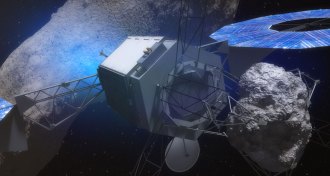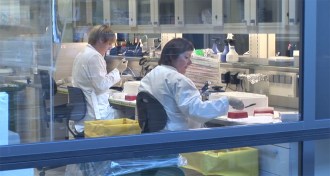All Stories
-
 Psychology
PsychologyLong-term study complicates understanding of child abuse
Sexual abuse and neglect get reported more if parents were maltreated as kids, which may lead authorities to overestimate some children’s risk of abuse.
By Bruce Bower -
 Climate
ClimateAntarctic ice shelves rapidly melting
Melting around Antarctica is accelerating, with several ice shelves projected to vanish entirely within 100 years.
-
 Life
LifeNo-fishing scheme in Great Barrier Reef succeeds with valuable fishes
Coral trout are thriving in marine protected areas in the Great Barrier Reef, but the no-take zones are having a smaller effect on other reef residents, a new 10-year report card shows.
By Susan Milius -
 Planetary Science
Planetary ScienceNASA has a plan for putting rock from asteroid in moon’s orbit
NASA selects concept for its Asteroid Redirect Mission, which will let astronauts train for future missions to Mars.
-
 Science & Society
Science & SocietyJohn Nash, Louis Nirenberg share math’s Abel Prize
John Nash and Louis Nirenberg will receive the 2015 ‘Nobel of mathematics’ for their work on partial differential equations.
-
 Chemistry
ChemistryIdea for new battery material isn’t nuts
Baking foam peanuts at high heat can form wee structures that lure lithium ions and could make for cheaper, more powerful batteries.
By Beth Mole -
 Genetics
GeneticsIceland lays bare its genomes
A detailed genetic portrait of the Icelandic population is helping scientists to identify the genetic underpinnings of disease.
-
 Animals
Animals‘If you build it they will come’ fails for turtle crossings
Turtles and snakes barely used an ecopassage built to make their movements safer. Scientists blame poor fencing that failed to keep them off the roadway.
-
 Quantum Physics
Quantum PhysicsOne photon wrangles 3,000 atoms into quantum entanglement
A single photon can trigger the creation of quantum entanglement between thousands of atoms.
By Andrew Grant -
 Psychology
PsychologyRethinking light’s speed, helping young adults with autism and more reader feedback
Readers discuss the best ways to replicate findings in scientific studies, help teenagers with autism transition to adulthood, and more.
-
 Chemistry
ChemistryAir pollution molecules make key immune protein go haywire
Reactive molecules in air pollution derail immune responses in the lung and can trigger life-long asthma.
By Beth Mole -
 Astronomy
AstronomyWhat’s in a name? In science, a lot
Classification systems are essential to science. But any classification system, however useful, is ultimately simplistic.
By Eva Emerson